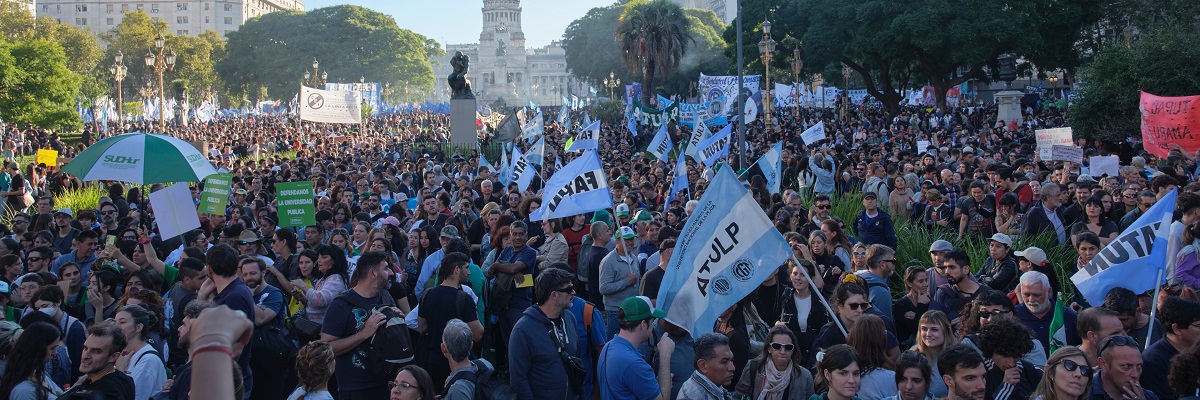Energy & Economics
Milei’s administration: Is freedom advancing?

Image Source : Shutterstock
Subscribe to our weekly newsletters for free
If you want to subscribe to World & New World Newsletter, please enter
your e-mail
Energy & Economics

Image Source : Shutterstock
First Published in: Jun.11,2024
Aug.26, 2024
The first months of Javier Milei's presidency in Argentina have been marked by deep tension and polarization. The striking statement by the Argentinian president, who declared "there is no money," was a clear warning of the inevitable economic recession. Paraphrasing Churchill, a tough phase of "blood, sweat, and tears" was thus inaugurated. Criticism of Milei's administration has pointed to its antisocial and erratic economic drift, fearing an increase in inequality and a possible bankruptcy. These critical voices question the extreme approach of his policies, warning about macroeconomic stability, freedoms, and the well-being of the population.
Inflation, which continues to soar, is eroding the purchasing power of families, and half of the population is living in poverty — 23 million Argentinians out of a total of 46 million inhabitants. This situation complicates economic planning for both families and businesses. A striking example is the increase in gas prices, which in some cases has risen by more than 300%. The initial political actions of Milei's administration have been based on drastic cuts to public services, mass layoffs, and reductions in key areas such as health, education, and transportation, which have sparked intense social mobilizations. This reduction in state spending has already led to the dismissal of tens of thousands of public employees, worsening the quality of life for the population. During the first months of Javier Milei's administration, widespread poverty in Argentina has intensified. The lack of opportunities and the economic crisis have left many families in a desperate situation, deepening the gap between the rich and the poor. The government is attempting to reverse this trend by eliminating social assistance programs and cutting essential services. Additionally, it is trying to impose labor precariousness without prior dialogue, which is seen by the labor movement as a serious attack on workers' rights.
The restriction of public spending and the goal of achieving a budget surplus have been cornerstones of Milei's administration. However, dismantling vital areas such as health, education, and transportation has not succeeded in restoring liquidity and confidence in the economic system. Economic policies must go beyond cold numbers and consider their human impact. Poverty in Argentina has become widespread, with 60% of the population struggling and 3.5 million people living in extreme poverty, without access to adequate housing or sufficient food. The purchasing power of families has diminished due to runaway inflation, cutting wages and pensions. Meanwhile, the prices of goods and services have skyrocketed, and tax revenues have plummeted. All social welfare indicators have worsened, and the Argentinian economy faces significant challenges. Milei’s government must seek a balance between economic stability and the quality of life for the population to address these challenges.
Additionally, significant restrictions on press freedom have been reported, further complicating the country's democratic situation. For example, on May 21st in Argentina, following serious conflicts between the Argentinian government and the press, social media platforms and public media websites were suspended. These decisions, coupled with a dismissive discourse towards those who disagree, have exacerbated tensions and political polarization. As a result, numerous voices have emerged advocating for more inclusive and dialogue-based policies to address the country's real issues. The social deterioration, persistent inflation, unbearable accumulated debt, and economic uncertainty must be addressed with rationality and moderation. The impoverishment of many Argentine families is not just a statistic; it represents broken lives and shattered dreams, with no signs that socioeconomic recovery is near.
‘La Libertad Avanza’ is the political party that supports Javier Milei, with a populist agenda. This movement aligns with the radical right-wing currents gaining ground globally, driven by the leadership of figures like Donald Trump, Jair Bolsonaro, Nayib Bukele, Giorgia Meloni, and Viktor Orbán, among others. The elections at the end of the year in the United States could mark a turning point in the success of this ideological current. For Milei, it would be very beneficial if Donald Trump returned to the presidency in the White House, even though he has recently been convicted by a court and still has several pending legal cases. Since Javier Milei assumed the presidency of Argentina, his administration has strayed from principles of dialogue, consensus, and the pursuit of the common good. The recent diplomatic incident in Spain, involving serious insults against the Spanish Prime Minister and his wife, is a clear example of this intentional provocation. Instead of moving toward greater freedom and prosperity, his government has deepened societal confrontation in Argentina.
In this context of division and confrontation, it becomes evident that Milei's government needs to adopt a more inclusive, flexible, and dialogue-driven approach that allows for building bridges and seeking consensual solutions to the problems Argentina faces. It can be concluded that Milei's management in his first months in office has not led to progress in terms of freedom. Instead, what seems to be advancing is harmful controversy and social polarization. The political decisions and statements of the Argentinian government have generated heated debates and further deepened the division and tension within Argentinian society, exacerbating existing tensions.
First published in :

José Manuel Corrales has an extensive academic and professional career in the field of Social and Legal Sciences. He holds a PhD from the University of La Laguna and has excelled with his thesis on employment policies in the Metropolitan Area of Tenerife, achieving the highest qualification. In addition, he has training in Regional Development, Training, and Employment, and holds a degree in Labor Sciences. He has worked as a university professor in various institutions, both in-person and online, and has held various positions of responsibility in the public administration of the Canary Islands, being a career civil servant in the regional field. His research has focused on topics such as Labor Relations, Labor Economics, and Occupational Health and Safety.
Unlock articles by signing up or logging in.
Become a member for unrestricted reading!